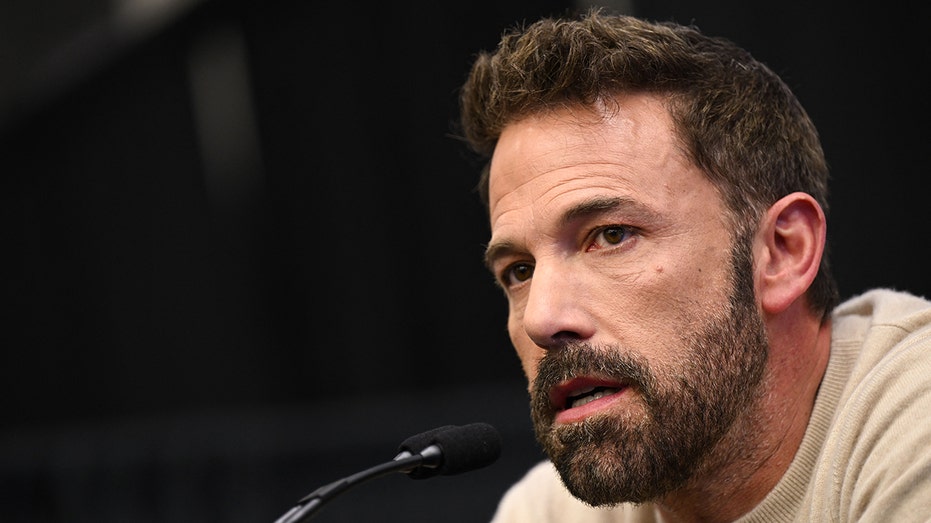
Ben Affleck is condemning Hollywood and the movie industry for how movies are financed. It’s an area he and pal Matt Damon are trying to redefine.
Ben Affleck has been in the business long enough to know that the entertainment industry is just as eager to chew you up and spit you out as they are to give you your big break.
That’s partially why he and his longtime pal, Matt Damon, launched Artists Equity, a production company that allows creators to invest in the content they’re making and have more control over what’s produced.
It’s an alternative to a star taking a big paycheck but having minimal involvement in the creative process.
MARK WAHLBERG REVEALS HIS THOUGHTS ON CANCEL CULTURE: ‘WE ALL HAVE OUR MOMENTS’
When actors partner with Artists Equity, they “become effectively like an investor in the sense that their contribution is treated equally with a financial investment,” Affleck told Deadline in a new interview where he criticized Hollywood’s past methods to succeeding in the film business. “They help manage the risk downward and they reap the rewards of that. That’s something that’s like common sense. But one of the problems with the way deals have evolved in Hollywood is that I think intentionally or not, people have been taught that the participation in projects isn’t real.
“We’ve gotten into this game of, okay, sure, well, it’s not gross, it’s net participation, and then these costs are going to build against it and it’s going to come after these fees. There’s this dance of, well, you’ll audit us, we’ll give a little, you’ll audit us again. And that has become this enshrined ritual in Hollywood. It may have been appropriate for a different economic climate in the movie business, but we don’t feel it’s appropriate when you’re asking people to commit their time and effort and artistry in the way that these filmmakers have committed theirs. They did so because they cared so much about [the] movie being made, but that doesn’t mean they should be taken advantage of. They are investors, and we wanted to treat them that way.”
LIKE WHAT YOU’RE READING? CLICK HERE FOR MORE ENTERTAINMENT NEWS
The “Good Will Hunting” star, who in recent years has stepped away from acting to focus on more directing and producing, says in his lengthy career, he’d be remiss to say he hasn’t taken a role just to earn a fat check; job security doesn’t exist.
“We’re all subject to this sort of insecurity in this business. Whether we’re actors or directors or writers, the phone could stop ringing for us. This is the time to take the money. But what that does is puts people at cross purposes,” he explained. “The people invested in the movie are not aligned exactly with the people who are doing it. And it’s not because they’re trying to just be extractive, it’s because they’ve learned, well, this is the only thing I can count on, this upfront money.
CLICK HERE TO SIGN UP FOR THE ENTERTAINMENT NEWSLETTER
“I don’t know when this might go away. I’m one errant remark away from being canceled, or I’m one movie bomb away from never working again, and I’ve got a family and so forth. Naturally, people seek to do what’s in their best interest.”
“And so that’s part of what you have to account for. It’s trying to straddle that divide and say, look, we’re going to tell you upfront, you have to invest something into the movie,” Affleck said.
Affleck pointed to his movie “Gigli,” which he starred in with his soon-to-be-ex-wife Jennifer Lopez, as “a famous example.”
“I got a big cash payday for that. Well, it doesn’t feel right in retrospect because they lost money. It wasn’t the biggest money-losing movie in history even though it was the most famous bomb in history, perhaps,” he admitted.
The film famously under-performed at the box office, making only a little over $7 million. Over $75 million was spent on financing the project.
“Nonetheless, that doesn’t sit right with me. But it also doesn’t sit right with people when they go, ‘Wait a minute. We all sacrificed to be committed to this.’ And then the old story about the $10 million movie that’s made $200 million and nobody’s seen a nickel.
“The answer is, fairness. That’s a basic fundamental principle that Matt and I are really drawn to, to create a fair deal for everybody that they can live with in success, in failure, or anywhere along the spectrum,” he said.
